Published Aug 28, 2024
Accommodations On Board: A Celebration of Disability in Star Trek
In Star Trek's future, disability isn't eradicated, but accepted.
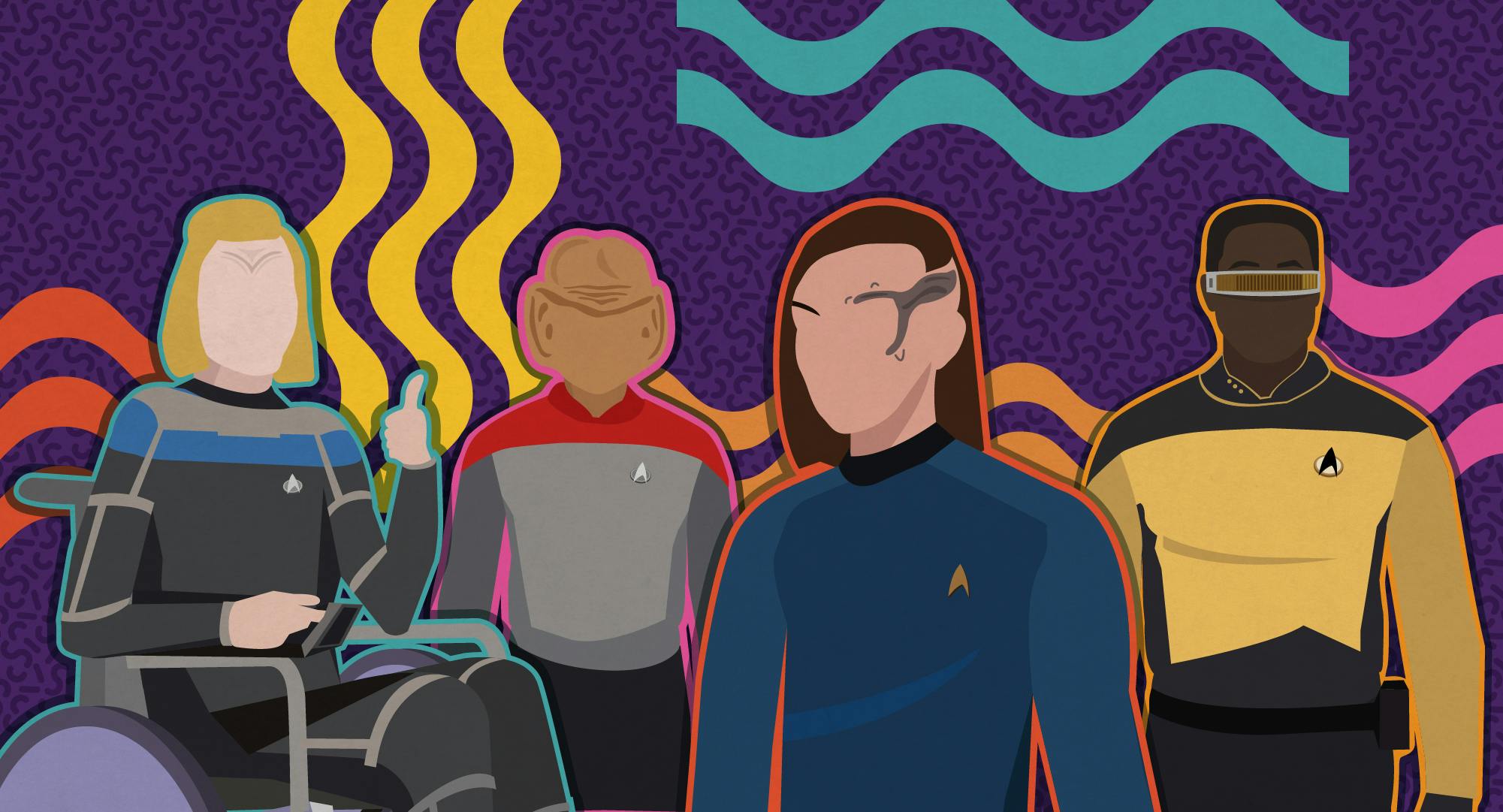
StarTrek.com
During the first press conference for , a reporter famously questioned Gene Roddenberry about Patrick Stewart's Captain Picard, "In the 24th Century, surely they would've cured baldness." Roddenberry's response? "No. By the 24th Century, no one will care."
While Roddenberry's vision for Star Trek was ever-evolving with the times and circumstances — for example, he himself wasn't interested in a bald captain until he saw Patrick Stewart's audition — this sentiment seemed to be Roddenberry's eventual thesis about deficiencies or disabilities in a utopia. In Star Trek's future, disability isn't eradicated, but accepted. When disabled people are so underestimated and dehumanized, that's groundbreaking. For all the good Star Trek has done for science fiction, fandoms, and franchises, one of the most revolutionary aspects of Roddenberry's vision was how his universe treats disability — with accommodations.
Throughout Star Trek's history, the show has featured quite a few disabled characters: . . . . Instead of using the medicine of the 24th Century to eliminate these conditions, Roddenberry created a universe where such disabilities exist and are managed, preferring accommodations over cures.

"Context is For Kings"
StarTrek.com
In the case of , Keyla Detmer didn't get a perfect makeover after the Klingons' attack of the U.S.S. Shenzhou, during which she sustained severe injuries ("Battle at the Binary Stars"). When the Starfleet doctors treated her wounds, they didn't replicate a magical, cosmetically perfect and organic replacement eye for her. Keyla got a cyborg implant. They made her vision functional, but they ensured the technology that restored her ocular ability was also accessible.
After all, if an organic replacement fails even the slightest bit, doctors have to start from scratch and do invasive surgery. If a cybernetic implant is a little wonky, they just get a tech specialist on it. There's a lot more room for comfort and error. In favoring upgrades and repair over cosmetics, Keyla is better accommodated for her high stakes work.
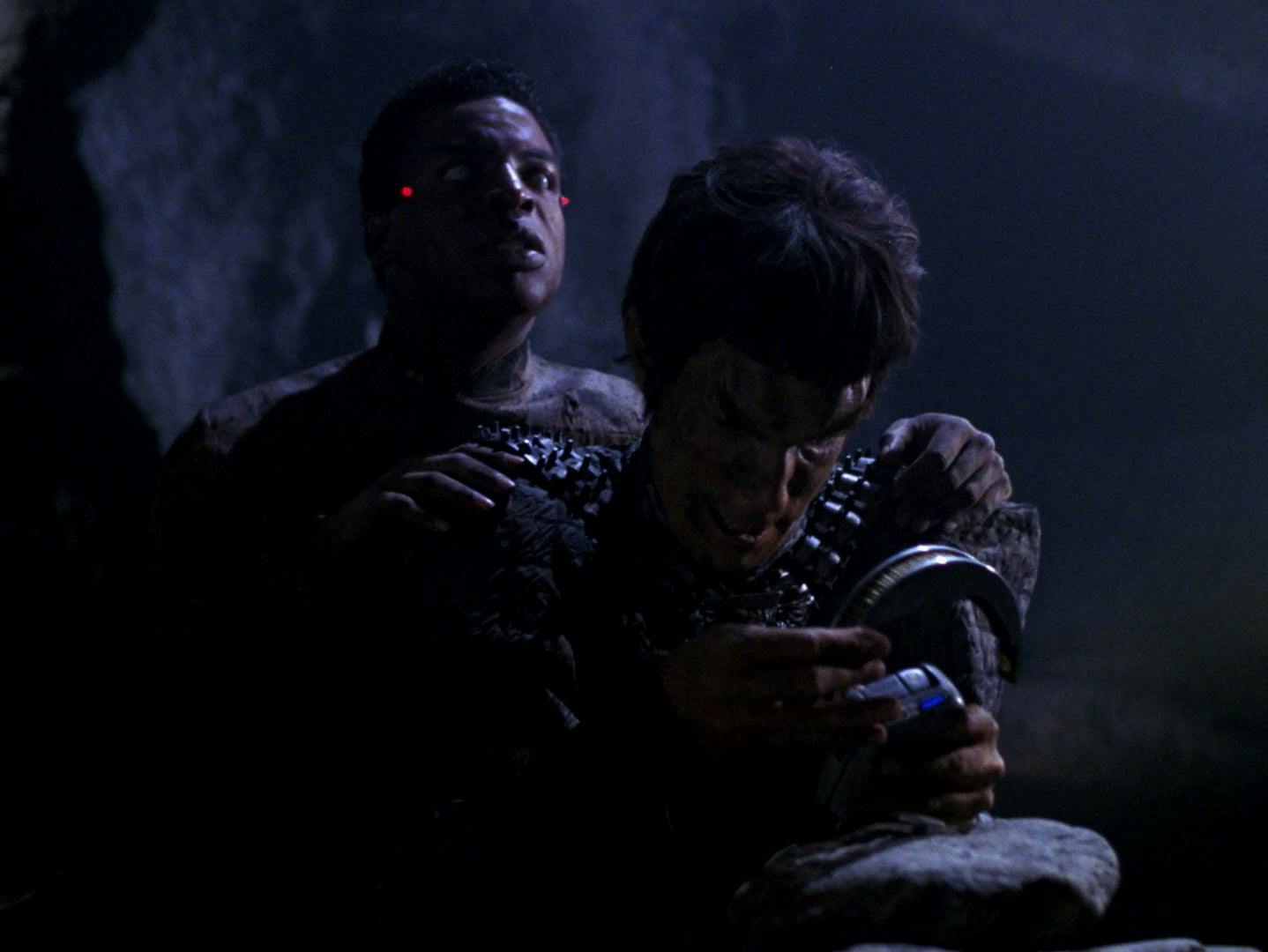
"The Enemy"
StarTrek.com
The same thing goes for Geordi — instead of eliminating blindness or trying to replace his entire ocular framework, he got his visor. And even when technology progressed, he got eye implants to replace his visor. He is still a blind man using a medical device, not someone getting invasive surgery to erase his disability. Accommodations, function, and acceptance are prized over being more "normal."
And for the disability community, embracing disability accommodations is one of the most powerful messages of support we can have.
For more context on the importance of accommodations and its role in the disabled community, we should start with the basics: defining accommodations. According to the U.S government, disability accommodations are exactly what they sound like — actions taken and options given to make a disabled person's life more manageable in the workplace and in public spaces. This can include the allowance of guide dogs into traditionally pet-free zones. Or, it can be offering a disabled student extra absence days or bonus time on tests.

"Melora"
StarTrek.com
Accommodations make such an important impact on the day-to-day lives of disabled people that governmental legislation exists to make space for them. In 1990, the U.S congress ratified the Americans with Disabilities Act (ADA). The ADA outlines the rights of disabled people, including building regulations, work accommodations, and protection from discrimination. This act has become a vital safeguard for disabled people to live productive, comfortable lives in society.
And in the ADA's spirit, Star Trek makes the same kind of space for its disabled characters, including a few ADA style mandates. For example, per the TNG era, all Starfleet ships are required to have a counselor as part of their crew. Similarly, in the case of Ensign Melora Pazlar, her quarters were modified to be able to emulate low gravity, so that she could experience her natural atmosphere in her room ("").
And when Star Trek lacks proper accommodations, there are stories about correcting that, too. Take Julian Bashir and his fellow genetically-modified humans(""). The Federation of Planets' ban on genetic modification/augments was well-intentioned — they wanted to do whatever possible to avoid another .
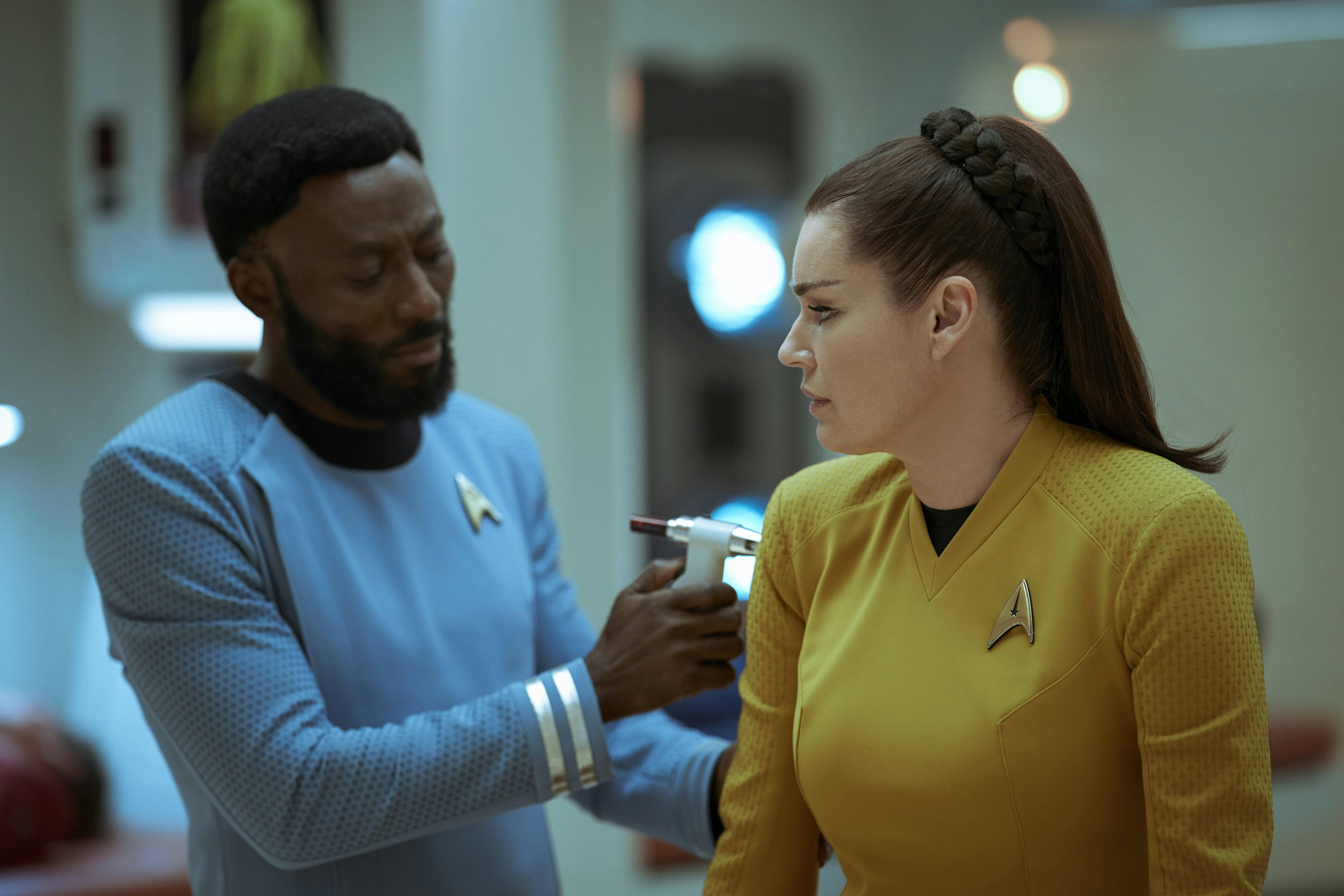
"Ghosts of Illyria"
StarTrek.com
However, that hard stance created space for a new kind of persecution and discrimination against children augmented against their will, including the likes of Commander Una Chin-Riley and Dr. Bashir — both of whom had to lie about their genes to get into Starfleet. Furthermore, because of the illegality of it, the augmentations that do still happen are often done so with shoddy practices. What results (at least in the case of Julian and his fellow instituted augments) are adults with severe developmental disparities. They often have a high capacity for pattern recognition and hyperfixation, but many other perceived social, communication, and empathic deficiencies. For anyone well-versed in the disability community, it's a pretty clear analogy for people with Autism Spectrum Disorder (ASD).
To properly dissect the augments' situation and how their story arc improved their acceptance and accommodations, let's discuss the case of Julian Bashir and his often-theorized ASD. As a child, Julian struggled with severe developmental delays. While his peers were learning mathematics and writing, he was unable to grasp even simple concepts of language and communication. Before his seventh birthday, his parents paid for him to be illegally augmented to catch up academically ("?"). While the results of Julian's procedure were "positive," Julian still felt like he lost a part of himself. He never felt accepted as a disabled person by his parents or by society. And the other augments, whose results were less favorable, never were allowed to integrate with society at all.

"Statistical Probabilities"
StarTrek.com
When looking at the history of autism, the story of Julian's fellow genetically modified humans (Jack, Sarina, Lauren, Patrick) mimics the relationship between ASD and Applied Behavior Analysis (ABA). In trying to get more "normal" kids, parents with autistic children take them to ABA therapy to try to replace their autistic behaviors with more neurotypical ones. Basically, this therapy process trains autistic children to do something called "masking," where they actively work to hide their stimming, sensory issues, and lack of social awareness to instead follow social convention, even if it's mentally taxing for them. In a fair amount of autistic individuals, they report that ABA did more harm to their psyche by suppressing their autistic traits. But the only reason Dr. Julian Bashir wasn't locked away with his fellow augments was because his procedure — his "masking" — went over well with society. He could hide his disability, so he was accepted.
And yet, Julian's "socially acceptable" status only exacerbated his struggles with identity and stress. And once his genetically-modified nature is revealed, Julian further reconnects to his disabled history by convincing Starfleet to let his fellow augments help with a Dominion War crisis. After that event, Julian truly realizes that the augments aren't the problem. That there were options to support these developmentally delayed people without medically harming them or casting them out from society. While the augments still go back to the institute at the end of the episode, they are given more freedoms, accommodations, support, resources, and basic human respect. It doesn't fix their parents' mistakes or give them full autonomy, but it does give them better lives than they had before.

"Ethics"
StarTrek.com
Beyond specific disabled characters, Star Trek has also made space for some of the most difficult conversations about disability — conversations about quality of life. In the TNG episode "," the debate around Worf's health after his spine injury ended up exactly where it should: focused on what Worf wants. While the surgery to save his spine was incredibly risky, it was Worf's choice. Yes, if he became a wheelchair user, he could still have a lush and fulfilling life. And he had the right to choose if he'd rather take medical measures to fight for his mobility, even if it was a much more dangerous procedure.
Similarly, when Captain Picard tries to give Counselor Troi advice after losing her empathic powers, she rightfully expresses that he doesn't understand what it's like to lose a sense like that (""). His pep talk is entirely tone deaf and uninformed. Telling disabled people how to react and feel about their disabilities is not respectful of their autonomy and experiences. That's a lot more nuance that one can normally expect from the '90s.
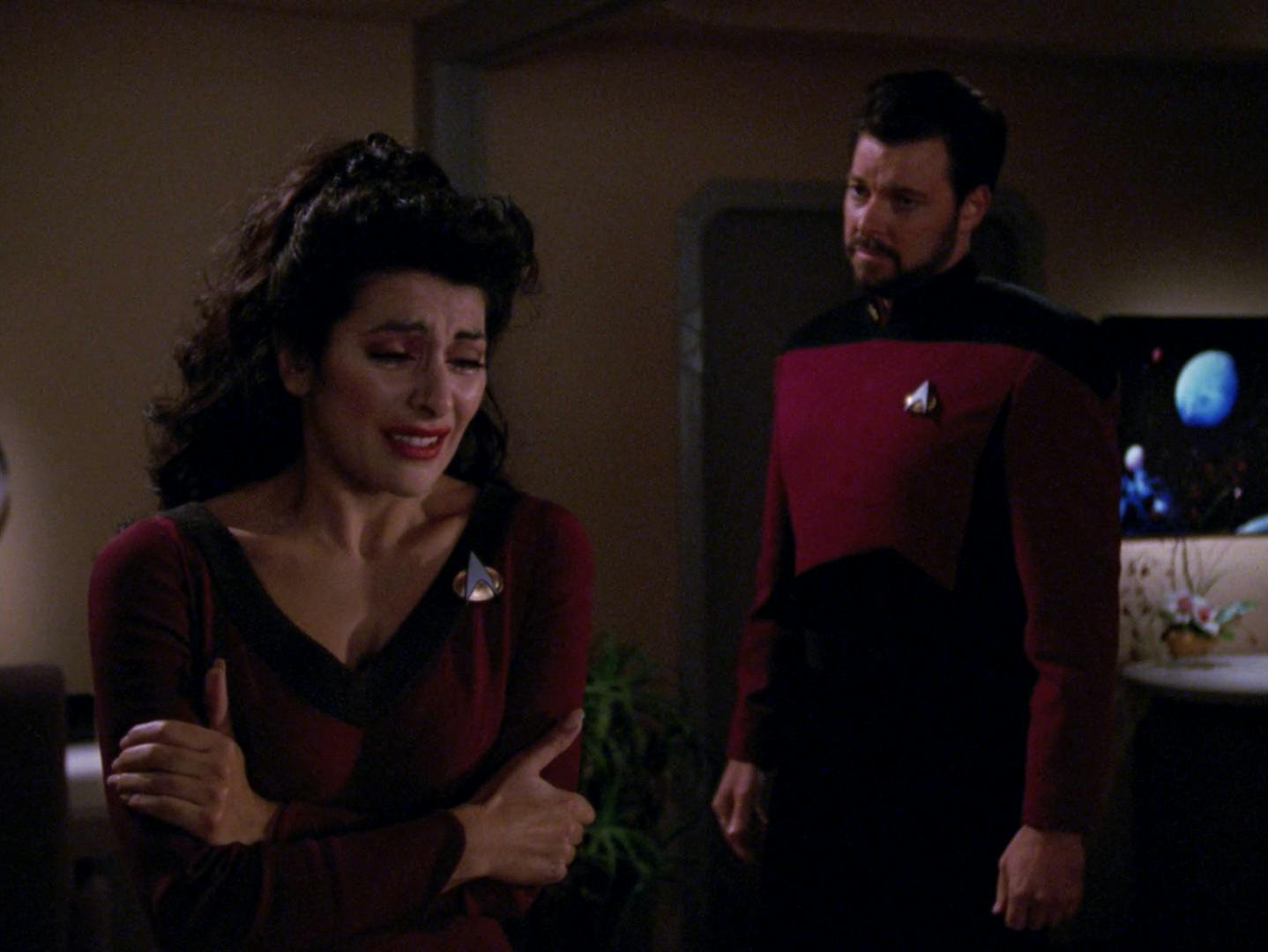
"The Loss"
StarTrek.com
Star Trek's portrayals of disability and accommodations aren't perfect — even in the case of Dr. Bashir, there are quite a few confusing messages about Julian "curing" fellow augment Sarina, finding her attractive only once she was more "normal," and then ending their romance when she began reverting to her previous mute state ("").
Earlier Trek contains some problematic depictions, too. For example, when Spock is temporarily blinded in "," his blindness is treated like a career-ending condition. While he certainly would need accommodations, Spock could have still been an effective officer — Geordi La Forge proves so. Meanwhile, Dr. Miranda Jones is a competent blind telepath that Kirk and crew meet (""). However, her depiction includes the tiresomely incorrect assumption that being blind/mute/deaf enhances your other senses.
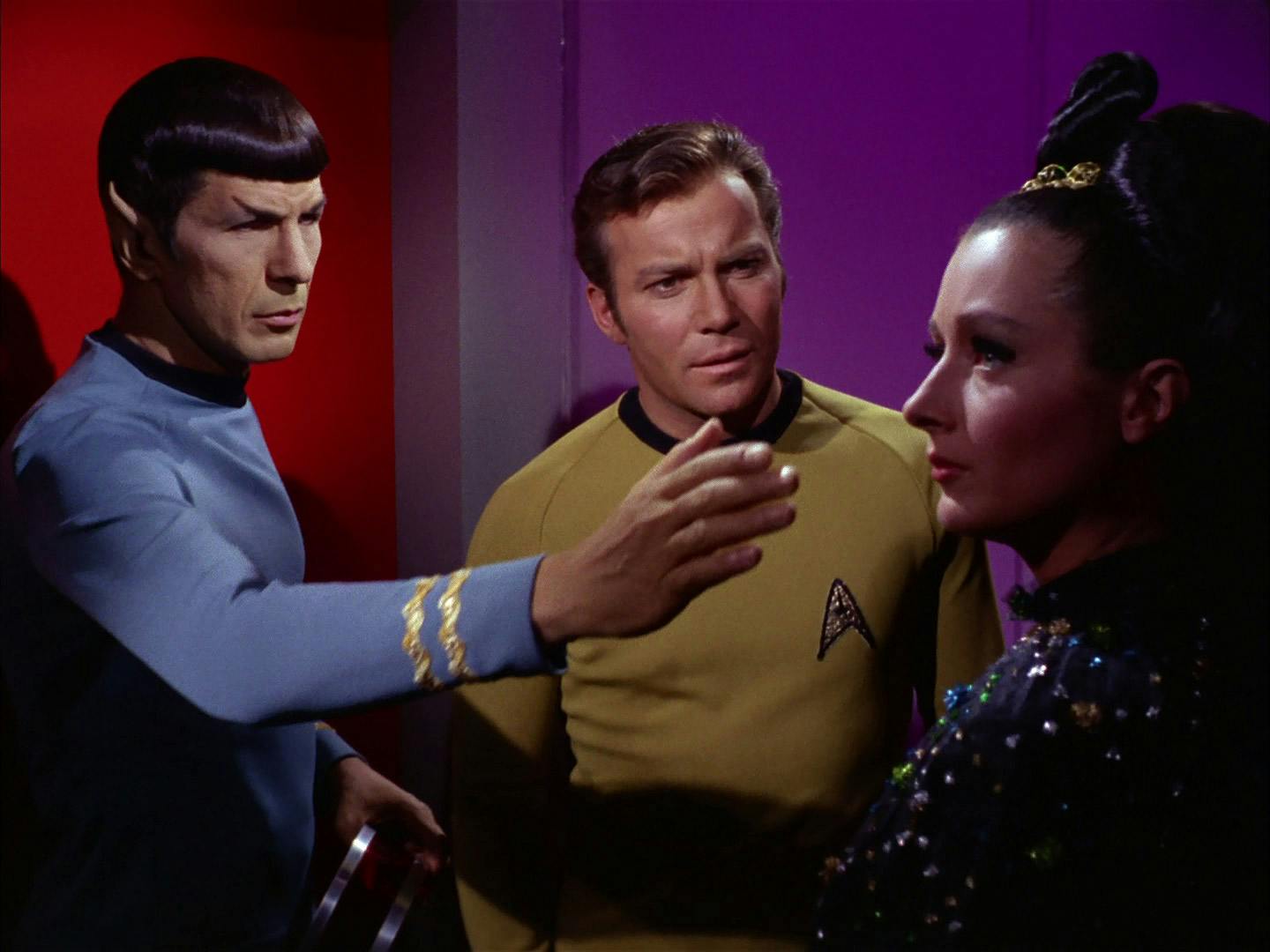
"Is There in Truth No Beauty?"
StarTrek.com
According to Merriam Webster, the definition of utopia is "a place of ideal perfection especially in laws, government, and social conditions." No matter what fans and detractors alike say, Gene Roddenberry decided that in his perfect future, disability and utopia can coexist. Nothing proves that belief quite like the Eugenics Wars.
In Star Trek lore, the use of genetic modification to try to create "perfect" humans (AKA following the principles of eugenics), led to nothing but competition, war, and worldwide destruction. In the pursuit of perfection, eugenics commits the scientifically fatal flaw of discouraging biodiversity. Without biodiversity, a gene pool ultimately repeats traits and genes, creating stronger, more dangerous recessive flaws. For Star Trek's Eugenics Wars, that flawed trait was an ambition for domination and violence. Disability, while imperfect, embraces biodiversity, which allows for even more complex combinations of genetic material and leads to much healthier communities. From a purely scientific point of view, allowing and accommodating disability is a much better route to utopia than elimination.
None of Star Trek's disability portrayals and accommodations have been perfect — but that's alright. Star Trek still exists as a rare piece of fiction that openly begins discussions about what life with disability looks like, and the adaptations necessary for disabled people to find a comfortable home in society. It's the fact that Star Trek has and keeps including disabled characters that makes the difference, especially in a modern world that argues so often about the rights of disabled people.
Disabled people need and deserve support and accommodations from their fellow humans because it leads to a better future.





